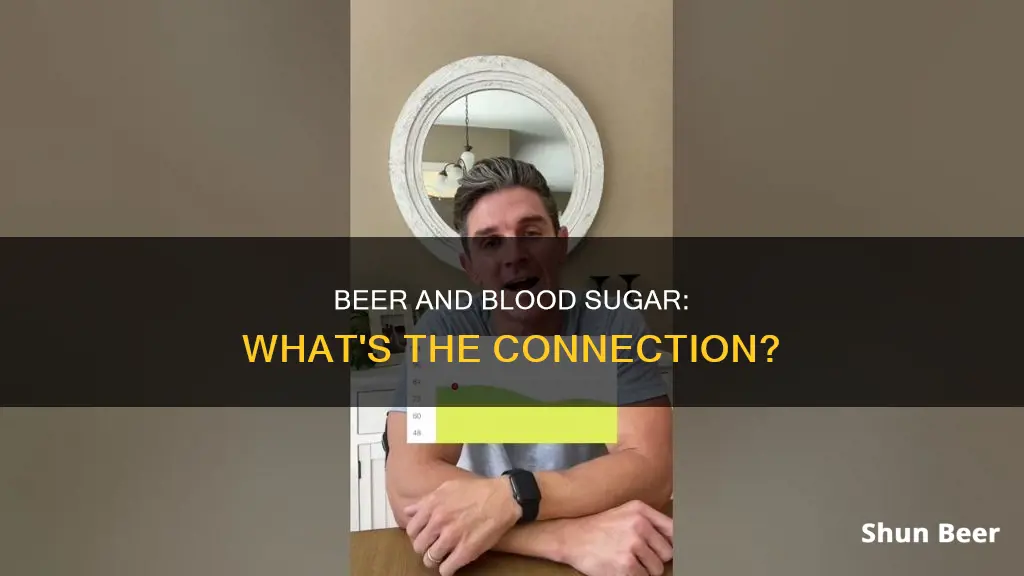
Alcohol can have a significant impact on blood sugar levels, especially for people with diabetes. The liver, which is responsible for releasing glucose into the bloodstream to maintain normal blood sugar levels, prioritises breaking down alcohol instead of releasing glucose when a person consumes alcoholic beverages. This can lead to a rapid drop in blood sugar levels, a condition known as hypoglycemia. The risk of hypoglycemia is higher when drinking on an empty stomach, and it can be dangerous if not managed properly. Additionally, alcohol can interfere with diabetes medications, affect weight gain, and stimulate the appetite, leading to potential overeating and further disruptions in blood sugar control. Understanding the effects of alcohol on blood sugar is crucial, especially for individuals with diabetes, to ensure safe and informed drinking choices.
| Characteristics | Values |
|---|---|
| Effect on blood sugar levels | Beer can increase blood glucose levels as it contains carbohydrates that get absorbed into the bloodstream relatively quickly. |
| Drinking a lot of beer can reduce blood glucose levels, causing hypoglycemia. | |
| Effect on appetite | Alcohol stimulates the appetite, which may cause overeating and disrupt blood sugar control. |
| Effect on weight | Alcoholic drinks often have a lot of calories, making it more difficult to lose excess weight. |
| Effect on diabetes medications | Alcohol can interfere with the positive effects of oral diabetes medicines or insulin. |
| Effect on other organs | Drinking too much beer can affect your heart health, increase kidney disease risk, increase insulin resistance, and exacerbate other health conditions. |
What You'll Learn

Beer increases blood glucose levels
Beer is an alcoholic drink that can influence your blood glucose levels in several ways. Beer contains carbohydrates that are quickly absorbed into the bloodstream, leading to increased glucose levels. This is usually observed shortly after consuming beer.
The effects of beer on blood sugar levels can be seen for up to 12 hours after your last drink. Beer impacts blood glucose levels by stimulating your appetite, so you may unknowingly overeat when drinking with a meal. This will increase blood glucose levels and may contribute to weight gain.
Additionally, alcohol interferes with blood sugar regulation by disrupting the hormones that control blood sugar levels. This can decrease insulin sensitivity, impacting the body's ability to regulate blood sugar effectively. Alcohol can also affect how well diabetes medications work, as it interferes with the effects of some diabetes medicines.
How Beer Affects Blood Sugar Levels
When you drink beer, your liver needs to break down the alcohol. While this happens, the liver stops releasing glucose, and your blood sugar level can drop quickly. This puts you at risk of low blood sugar (hypoglycaemia). Drinking without eating food at the same time also increases this risk.
Alcohol's Impact on the Body and Diabetes
Alcohol has a lot of calories, which can lead to weight gain and make it harder to manage diabetes. Calories from alcohol are stored in the liver as fat, and liver fat makes liver cells more insulin resistant, increasing blood sugar levels over time. Alcohol can also worsen diabetes-related complications such as disturbances in fat metabolism, nerve damage, and eye damage.
Tips for Drinking Beer Without Spiking Your Blood Sugar
If you have diabetes and want to drink beer, there are some things to keep in mind:
- Never drink alcohol instead of a meal.
- Avoid drinking on an empty stomach.
- Stay away from mixed drinks with a lot of sugar.
- Drink in moderation.
- Don't drink right after exercising.
Sweetening Carbonated Beer: Sugar Quantity for 16 Oz
You may want to see also

Beer impacts blood glucose levels
Beer and other alcoholic drinks can have a significant impact on blood glucose levels, especially for people with diabetes. While alcohol can affect blood sugar levels immediately after drinking, its effects can last up to 12 hours after the last drink. Here are some key ways in which beer influences blood glucose levels:
- Beer can increase blood glucose levels: Beer contains carbohydrates, which are quickly absorbed into the bloodstream, leading to elevated blood sugar levels. This is usually observed shortly after consuming alcohol.
- Excessive beer consumption can reduce blood glucose levels: Hypoglycemia, or low blood glucose levels, can be dangerous and is more likely to occur for those with type 1 diabetes or type 2 diabetes using insulin. The effects can range from mild, such as fatigue and sweating, to severe, including seizures and loss of consciousness.
- Alcohol interferes with blood sugar regulation: Alcohol consumption can affect the hormones that regulate blood sugar levels. It diverts metabolic pathways, disrupting glucose production in the liver and contributing to low blood sugar.
- Alcohol can affect diabetes medications: Alcohol can interfere with hypoglycemic medications, reducing their effectiveness. It can also worsen diabetes-related medical complications, such as disturbances in fat metabolism, nerve damage, and eye disease.
- Beer impacts weight gain and blood pressure: Alcohol stimulates the appetite, often leading to overeating and weight gain. Beer and sweet wines can be high in carbohydrates, which can temporarily raise blood sugar levels. Additionally, excessive alcohol consumption can increase triglyceride levels (fat in the blood) and blood pressure.
- Symptoms of hypoglycemia and alcohol consumption overlap: Both hypoglycemia and alcohol consumption can cause symptoms such as flushing, nausea, increased heart rate, and slurred speech. This overlap can make it challenging to distinguish between low blood sugar and the effects of alcohol, potentially delaying necessary treatment.
Beer and Sugar: What's the Connection?
You may want to see also

Alcohol interferes with blood sugar regulation
Alcohol interferes with the body's ability to regulate blood sugar levels. When you drink alcohol, your liver breaks it down instead of releasing glucose, causing your blood sugar levels to drop. This is more likely to happen when drinking on an empty stomach. The liver takes about 1 to 1.5 hours to process each alcoholic drink, and during this time, you may be at risk of low blood sugar. The more drinks you have, the higher the risk.
According to the NIH, alcohol consumption can affect the hormones that regulate blood sugar levels. Dr. Kelvin Fernandez, an internal medicine physician, states that "alcohol diverts metabolic pathways, disrupting glucose production in the liver, and contributing to low blood sugar. It can also decrease insulin sensitivity, impacting the body's ability to regulate blood sugar effectively."
Alcohol can also affect diabetes medications. It may interfere with hypoglycemic medications, making them less effective. Additionally, alcohol reduces the function of organs like the liver and pancreas, which are crucial for glucose control.
It is important for people with diabetes to understand the risks associated with alcohol consumption and to drink in moderation, ensuring they consume food and carbohydrates along with their drinks.
Beer's Sugar Impact: What Happens in the Body?
You may want to see also

Alcohol can affect diabetes medications
Alcohol can affect the liver's ability to regulate blood sugar and may interfere with diabetes medications. The liver's main function is to store glycogen, which is the stored form of glucose, and release it into the bloodstream to maintain normal blood sugar levels. When you drink alcohol, your liver prioritises breaking it down over its role in regulating blood sugar. This can lead to a rapid drop in blood sugar levels, putting individuals at risk of hypoglycaemia, especially if they are taking insulin or certain diabetes medications.
Alcohol can interfere with the effects of diabetes medications, increasing the risk of hypoglycaemia or hyperglycaemia, depending on how much alcohol is consumed and the type of medication taken. It is important for individuals taking oral diabetes medications to consult their healthcare provider to understand if it is safe to consume alcohol and how it may impact their blood sugar levels.
Additionally, alcohol may worsen diabetes-related complications such as disturbances in fat metabolism, nerve damage, and eye disease. It can also increase the risk of peripheral neuropathy, a condition that damages nerves extending from the spinal cord, which control muscle function and transmit sensations. Alcohol consumption has also been linked to an increased risk of developing diabetic retinopathy, a leading cause of blindness.
Furthermore, alcohol can affect the liver's ability to produce glucose, so it is crucial to test blood sugar levels before consuming alcohol. Alcohol can cause blood sugar levels to drop within a few minutes of consumption and for up to 12 hours afterward. Therefore, individuals with diabetes should monitor their blood glucose levels regularly and be cautious when consuming alcohol, even occasionally.
Sugar Secrets: Priming Beer with Precise Sugar Grams
You may want to see also

Alcohol can cause low blood sugar
The liver takes about 1 to 1.5 hours to process each alcoholic drink, and during this time, you may be at risk of low blood sugar. If you've had alcohol before bed, it's a good idea to test your glucose level and consume a carbohydrate-rich snack if it's low.
Drinking alcohol can also affect people with diabetes in several other ways. Alcohol stimulates your appetite and may cause you to overeat, disrupting your blood sugar control. Alcoholic drinks are often high in calories, making it more difficult to lose weight. Small amounts of beer and sweet wines can be high in carbohydrates, which can temporarily raise blood sugar levels.
Additionally, alcohol can cause symptoms such as flushing, nausea, increased heart rate, and slurred speech, which can be confused with or mask the symptoms of low blood sugar. This makes it challenging to determine if you've had too much to drink or if your blood sugar is dropping to dangerously low levels.
If you have diabetes, it is recommended to drink in moderation and only when your blood sugar levels are well-managed. It's also a good idea to consult your doctor to understand if drinking alcohol is safe for you and to get guidelines based on your specific health concerns.
Coke vs Beer: Which Drink Contains More Sugar?
You may want to see also
Frequently asked questions
Beer contains carbohydrates, which get absorbed into the bloodstream relatively quickly, leading to increased glucose levels. Beer can also reduce blood glucose levels, causing hypoglycemia, especially for those with type 1 or type 2 diabetes who use insulin.
Drinking beer can cause low or high blood sugar, depending on how much you drink and whether you've eaten food. It can also affect your diabetes medication and cause other health issues, such as weight gain, increased blood pressure, and diabetic complications.
It's recommended that men have no more than two drinks per day and women no more than one. However, it's best to consult your doctor to determine what's safe for you based on your specific health concerns.
Symptoms of low blood sugar include headaches, irregular heartbeat, anxiety, confusion, seizures, and in more severe cases, loss of consciousness. These symptoms can be similar to those of alcohol intoxication, making it difficult to tell if you need to raise your blood sugar or if you've had too much to drink.
Yes, light beers, dry wines, distilled spirits, and low-carb cocktails typically have fewer carbohydrates and calories, which can help you manage your blood sugar levels better. However, it's still important to drink in moderation and always consult your doctor to understand how alcohol interacts with your specific health conditions and medications.







